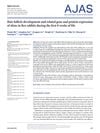71 citations,
November 2005 in “The journal of investigative dermatology. Symposium proceedings/The Journal of investigative dermatology symposium proceedings” Edar signaling is crucial for proper hair follicle development and function.
 43 citations,
December 2008 in “Molecular biology of the cell”
43 citations,
December 2008 in “Molecular biology of the cell” Disrupting Smad4 in mouse skin causes early hair follicle stem cell activity that leads to their eventual depletion.
 June 2010 in “Expert Review of Dermatology”
June 2010 in “Expert Review of Dermatology” Scientists found key proteins and genes that affect skin and hair health, and identified potential new treatments for hair loss, skin disorders, and wound healing.
 February 2024 in “Journal of dermatology”
February 2024 in “Journal of dermatology” CGF therapy may help hair regrowth and improve scars in DLE patients.
8 citations,
January 2019 in “The journal of investigative dermatology/Journal of investigative dermatology” Growth hormone is important for regulating human hair growth.
 66 citations,
March 2019 in “Cellular and Molecular Life Sciences”
66 citations,
March 2019 in “Cellular and Molecular Life Sciences” Melanocyte development from neural crest cells is complex and influenced by many factors, and better understanding could help treat skin disorders.
 1 citations,
April 2020 in “Journal of The European Academy of Dermatology and Venereology”
1 citations,
April 2020 in “Journal of The European Academy of Dermatology and Venereology” Drugs like PDEI may help hair disorders like AGA.
10 citations,
September 2016 in “Animal genetics” Researchers identified key genes and proteins linked to wool growth in sheep.
 6 citations,
April 1996 in “Journal of histochemistry and cytochemistry/The journal of histochemistry and cytochemistry”
6 citations,
April 1996 in “Journal of histochemistry and cytochemistry/The journal of histochemistry and cytochemistry” TGF-alpha is present in sheep and ferret skin and may affect hair growth without directly stimulating cell proliferation.
 6 citations,
January 2022 in “Journal of Investigative Dermatology”
6 citations,
January 2022 in “Journal of Investigative Dermatology” Male pattern baldness is linked to higher levels of a certain receptor in the scalp, which leads to the shrinking of blood vessels and hair loss. Early treatment targeting this receptor could be more effective.
 16 citations,
February 2022 in “Science Advances”
16 citations,
February 2022 in “Science Advances” Follistatin and LIN28B together improve the ability of inner ear cells in mice to regenerate into hearing cells.
2 citations,
January 2019 in “Methods in molecular biology” A new method helps grow skin cells from humans and mice more easily and quickly.
 April 2008 in “Medical & surgical dermatology”
April 2008 in “Medical & surgical dermatology” Certain hairstyles can cause scalp diseases, smoking is linked to hair loss, 5% minoxidil foam is effective for hair loss treatment, and various factors influence wound healing and hair growth.
 14 citations,
January 2006 in “Skin pharmacology and physiology”
14 citations,
January 2006 in “Skin pharmacology and physiology” Procyanidin compounds from apples and barley promote hair growth and prevent hair cell death.
 9 citations,
January 2017 in “Elsevier eBooks”
9 citations,
January 2017 in “Elsevier eBooks” Skin's epithelial stem cells are crucial for repair and maintenance, and understanding them could improve treatments for skin problems.
 September 2021 in “VNU Journal of Science: Medical and Pharmaceutical Sciences”
September 2021 in “VNU Journal of Science: Medical and Pharmaceutical Sciences” Platelet-rich plasma, which has growth factors, is used in many medical fields and can promote tissue repair, stimulate hair growth, and increase hair density.
 December 2018 in “Journal of Medicinal and Aromatic Plant Sciences”
December 2018 in “Journal of Medicinal and Aromatic Plant Sciences” Some plants like Eclipta alba, Nardostachys jatamansi, and Rumex japonicus may help hair growth.
 3 citations,
September 2019 in “Clinical and experimental dermatology”
3 citations,
September 2019 in “Clinical and experimental dermatology” Basal cell carcinomas may differentiate similarly to hair follicles and could be influenced by hair cycle-related treatments.
 14 citations,
September 2018 in “Asian-Australasian Journal of Animal Sciences”
14 citations,
September 2018 in “Asian-Australasian Journal of Animal Sciences” Rex rabbits' hair follicles develop dynamically in the first 8 weeks, with key genes and proteins changing over time.
10 citations,
February 2019 in “Journal of cellular physiology” TGF-β2 helps yak hair follicles enter the regression phase, while HSP70 tries to prevent it.
4 citations,
September 2016 in “World Rabbit Science” High wool density in Rex rabbits is linked to specific gene activity affecting hair follicle development.
 6 citations,
September 2019 in “Archives of Dermatological Research”
6 citations,
September 2019 in “Archives of Dermatological Research” Found 32 genes linked to male baldness, affecting hair growth and stress-related pathways.
 July 2020 in “Benha Medical Journal”
July 2020 in “Benha Medical Journal” People with severe Alopecia Areata have higher levels of TGF-β1, which may play a role in the condition.
 November 2024 in “Journal of Investigative Dermatology”
November 2024 in “Journal of Investigative Dermatology” TGF-β signaling is essential for new hair growth after wounds.
 41 citations,
December 2018 in “Experimental Dermatology”
41 citations,
December 2018 in “Experimental Dermatology” Understanding how melanocyte stem cells work could lead to new treatments for hair graying and skin pigmentation disorders.
 1 citations,
August 2023 in “Biomolecules & therapeutics”
1 citations,
August 2023 in “Biomolecules & therapeutics” HAPLN1 can promote hair growth and may help treat hair loss.
 4 citations,
April 2021 in “Journal of Cosmetic Dermatology”
4 citations,
April 2021 in “Journal of Cosmetic Dermatology” Botulinum toxin may help hair loss by increasing blood flow and reducing harmful factors.
 3 citations,
January 2024 in “Liver International”
3 citations,
January 2024 in “Liver International” Targeting thyroid hormone receptor α in liver cells may help treat liver fibrosis.
March 2020 in “Research Square (Research Square)” Type 2 diabetic stem cells can still help heal wounds effectively.
 December 2023 in “International journal of multidisciplinary research and analysis”
December 2023 in “International journal of multidisciplinary research and analysis” SH-MSCs gel reduced IL-6 and increased TGF-β, suggesting it could treat alopecia.






















